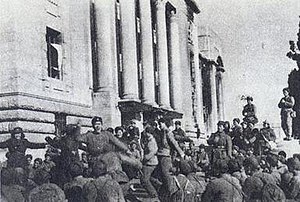
Back معركة سول الثالثة Arabic Kolmas Souli lahing Estonian Troisième bataille de Séoul French 第3次ソウルの戦い Japanese 1·4 후퇴 Korean Trận Seoul lần thứ ba Vietnamese 第三次汉城战役 Chinese
37°34′08″N 126°58′36″E / 37.56889°N 126.97667°E
| Third Battle of Seoul | |||||||
|---|---|---|---|---|---|---|---|
| Part of the Korean War | |||||||
 Chinese troops celebrate the capture of Seoul. | |||||||
| |||||||
| Belligerents | |||||||
|
| |||||||
| Commanders and leaders | |||||||
|
|
| ||||||
| Units involved | |||||||
|
| |||||||
| Strength | |||||||
|
| ~170,000[8] | ||||||
| Casualties and losses | |||||||
|
|
China: ~5,800 North Korea: ~2,700[12] | ||||||
The Third Battle of Seoul was a battle of the Korean War, which took place from December 31, 1950, to January 7, 1951, around the South Korean capital of Seoul. It is also known as the Chinese New Year's Offensive, the January–Fourth Retreat (Korean: 1·4 후퇴) or the Third Phase Campaign Western Sector[nb 4] (Chinese: 第三次战役西线; pinyin: Dì Sān Cì Zhàn Yì Xī Xiàn).
In the aftermath of the major Chinese People's Volunteer Army (PVA) victory at the Battle of the Ch'ongch'on River, the United Nations Command (UN) started to contemplate the possibility of evacuation from the Korean Peninsula. Chinese Communist Party chairman Mao Zedong ordered the Chinese People's Volunteer Army to cross the 38th Parallel in an effort to pressure the UN forces to withdraw from South Korea.
On December 31, 1950, the Chinese 13th Army attacked the Republic of Korea Army (ROK)'s 1st, 2nd, 5th and 6th Infantry Divisions along the 38th Parallel, breaching UN defenses at the Imjin River, Hantan River, Gapyeong and Chuncheon in the process. To prevent the PVA forces from overwhelming the defenders, the US Eighth Army now under the command of Lieutenant General Matthew B. Ridgway evacuated Seoul on January 3, 1951.
Although PVA forces captured Seoul by the end of the battle, the Chinese invasion of South Korea galvanized the UN support for South Korea, while the idea of evacuation was soon abandoned by the UN Command. At the same time, the PVA were exhausted after months of nonstop fighting since the start of the Chinese intervention, thereby allowing the UN forces to regain the initiative in Korea. The city would change hands one more time in Operation Ripper.
- ^ Chae, Chung & Yang 2001, p. 302.
- ^ Chae, Chung & Yang 2001, p. 242.
- ^ Appleman 1990, p. 63.
- ^ Ministry of Patriots and Veterans Affairs 2010, p. 119.
- ^ Chinese Military Science Academy 2000, p. 369.
- ^ Ministry of Patriots and Veterans Affairs 2010, p. 72.
- ^ Appleman 1990, p. 40.
- ^ Appleman 1990, p. 42.
- ^ Ecker 2005, p. 74.
- ^ Appleman 1990, p. 71.
- ^ Coulthard-Clark 2001, p. 262.
- ^ Zhang 1995, p. 132.
Cite error: There are <ref group=nb> tags on this page, but the references will not show without a {{reflist|group=nb}} template (see the help page).